













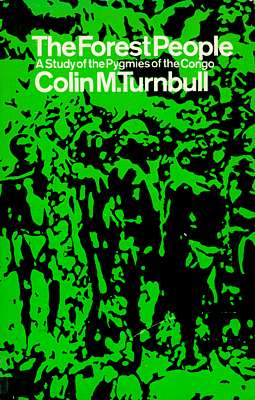
The Forest People: A Study of the Pygmies of the Congo by Colin M. Turnbull.
NOTE: We have 75,000 books in our library, almost 10,000 different titles. Odds are we have other copies of this same title in varying conditions, some less expensive, some better condition. We might also have different editions as well (some paperback, some hardcover, oftentimes international editions). If you don’t see what you want, please contact us and ask. We’re happy to send you a summary of the differing conditions and prices we may have for the same title.
DESCRIPTION: Softcover: 295 pages. Publisher: A Touchstone Book published by Simon and Schuster; (1962). "The Forest People", a study of the BaMbuti Pygmies of the Congo, has become a classic work in the finest tradition of literate anthropology. Its author, Colin M. Turnbull, was at the time a young anthropologist and eventually Curator of African Ethnology at the American Museum of Natural History, lived with the BaMbuti for three years. He did so not as a clinical observer from the outside world, but as a friend learning their customs and sharing their daily life.
In this celebrated account, he describes their hunting parties and nomadic camps, their love affairs and ancient ceremonies - the molimo, in which they praise the forest as provider, protector, and deity; the elima, in which the young girls come of age; and the nkumbi circumcision rites, in which the villagers of the surrounding non-Pygmy tribes attempt to impose their culture on the Pygmies, whose forest home they dare not enter.
CONDITION: VERY GOOD (MINUS). Unread (?) oversized softcover. Touchstone Books (1983) 196 pages. On the inside, the book appears never read. Pages are pristine; clean, crisp, unmarked, unmutilated, tightly bound, perhaps flipped through once or twice, but almost certainly never read. Pages are bound tight as new. From the outside the book is pretty rough evidencing considerable shelfwear. It's not a disaster or unattractive, however there are neatly repaired 1/2 inch edge tears (made with invisible ("scotch") tape, to the top edge of the front cover, as well as both to the cover spine head and heel. The cover also shows considerable rubbing to the extremities (edges and corners). The back cover, which is white, also shows a few marks. Though clearly this book lacks the "sex appeal" of a "shelf trophy", nonetheless as a budget-priced "reading copy", it is otherwise clean and only lightly read. For those not concerned with whether the book will or will not enhance their social status or intellectual reputation, it's a solid reading copy at an attractive price. Satisfaction unconditionally guaranteed. In stock, ready to ship. No disappointments, no excuses. PROMPT SHIPPING! HEAVILY PADDED, DAMAGE-FREE PACKAGING! #1033b.
PLEASE SEE IMAGES BELOW FOR SAMPLE PAGES FROM INSIDE OF BOOK.
PLEASE SEE PUBLISHER, PROFESSIONAL, AND READER REVIEWS BELOW.
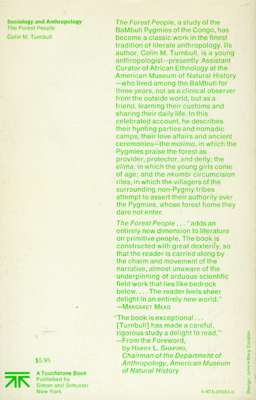
Colin M. Turnbull's best-selling, classic work describes the author's experiences while living with the BaMbuti Pygmies, not as a clinical observer, but as their friend learning their customs and sharing their daily life. Turnbill conveys the lives and feelings of the BaMbuti whose existence centers on their intense love for their forest world, which, in return for their affection and trust, provides their every need. We witness their hunting parties and nomadic camps; their love affairs and ancient ceremonies "The Forest People" eloquently shows us a people who have found in the forest something that makes their life more than just living, a life that, with all its hardships and problems and tragedies, is a wonderful thing of happiness and joy.
"The Forest People" adds an entirely new dimension to literature on primitive people. The book is constructed with great dexterity, so that the reader is carried along by the charm and movement of the narrative, almost unaware of the underpinning of arduous scientific field work that lies like bedrock below. The reader feels sheer delight in an entirely new world. [Margaret Mead]
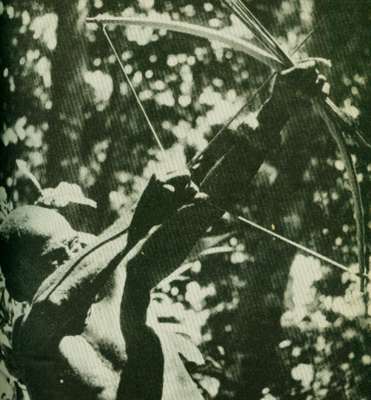
[Harry Shapiro, Curator of Physical Anthropology, American Museum of Natural History] "The Forest People" is about the life of a Pygmy people living in the Ituri Forest of the Congo. Its author is an anthropologist. The book is exceptional. Most of the literature on the life of "primitive" people is in the form of fairly technical reports in which individuals are swallowed up by the abstractions and feeling is replaced by analysis. Consequentially you get little idea from these monographs of what it is like to lead the kind of life they describe, or what the people observed are really like as human beings.
One of the reasons why "The Forest People" is an exceptional book is because its author, Colin M. Turnbull, was an anthropologist who knew the Pygmies intimately from years of living among them. In this book he has fortunately chosen the unusual course of writing about them as individuals, as his friends, each with a personality of his own. From his knowledge of their culture and its adaptation to the conditions of an African rain forest, he is able to provide another dimension to their lives that the casual visitor might easily miss altogether. As a result the reader can enter into some understanding of the meaning of their lives and enjoy the exhilaration of participating in a culture other than his own.
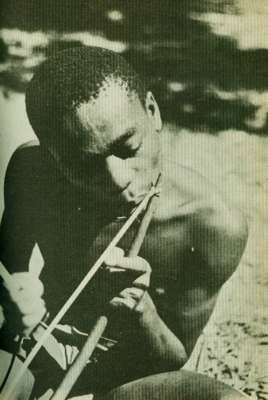
I first read The Forest People when I was in college. I took an anthropology course, and I was absolutely enchanted by this book. First of all, do not fear that this book is written by an anthropologist using dry and boring language and by an absolutely objective thus unimpassioned observer. This is not a book filled with statistics and boring observations and theories. No, Turnbull described the life of the Mbuti pygmies with such color, exuberance, detail and a healthy dash of humour that you cannot help but just being entranced by this book.
You will learn of their daily lives, their hissy fits with each other, their methods of punishment, their relationship with the "negro" villagers whom they think are animals because they do not understand the forest. You will see their marriage rites, the rituals of the Molimo and the celebration of the Elima, when young pygmy girls are first "blessed" by menstrual blood. You will see the pygmies as individuals each with his or her own personality. Kenge the author's best friend, Moke an elderly and respected member of the Mbuti, Cephu the "bad hunter", beautiful Kidaya of the Elima, Kondabate the pygmy belle who filed her teeth like a shark's, flirtatious Akidinimba with her infamously huge bosoms, "ugly" Aberi, Kamaikan, Kelemoke and even Amina, the daughter of a sub-chief from a nearby village. You will get to know them and feel as if you have known them all your lives.
The Forest People is one of the best books ever written on anthropology. You can't help but think about how life, as simple as it seems for the Pygmies, is still filled with both joy and tribulations. I have read this book many times and every time it still has not lost its magic on me. This book was written in the 1960's. Turnbull has since passed away. I cannot help but think about what happened to all these wonderful people we meet in the book today. Did Kenge have any children since? Did Kondabate ever have a child? Did Akidinimba stayed married? I just wish that there's a sequel to this wonderful book.
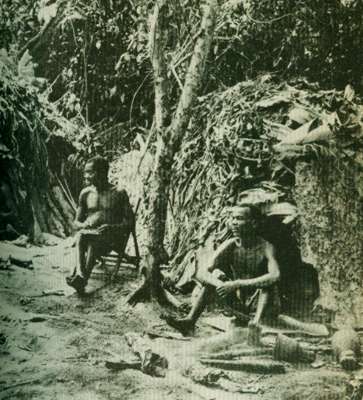
This is an account first published in 1961, of a year (1956) spent by the author, anthropologist Colin Turnbull, among a clan of Pygmies of the Ituri Forest in Northwestern Belgian Congo (later Zaire, now Democratic Republic of Congo). I found it a fascinating read. It's fashionable, and all too easy, to pooh-pooh the work of anthropologists living amongst primitive tribes, but the author's done something that none of us have, and for that, and for the obvious love and respect that he felt for the pygmies with whom he lived, the work is worthy of respect.
What stands out most, for me, in the account is the essential common humanity of the pygmies. In their petty jealousies, rivalries, flirtations; in their practical joking, on each other and on the African villagers who view them as property, as much as the romanticized, spiritual world of the forest, I saw "us" reflected clearly. Some of the aspects that will stay with me include the double-edged relationship with the African negro "villagers", for whom the pygmies are a kind of property; one that supplies them with a less than reliable source of meat, honey and other forest foods, and occasionally labor - and who compel the pygmies to observe their initiation, marriage and funeral rites.
The pygmies on the other hand receive some food from the villagers' plots, and steal more without compunction, and disappear into the forest for months when the whim takes them. Equally indelible were the spiritual forest rites, especially the men's kumamolimo, with its mysterious voice of the forest the molimo. Actually an instrument like an Australian aboriginal didgeridoo, normally made from a hollowed out tree. Turnbull is "put out" by the sacrilege of his clan using a 15-foot metal pipe for this purpose, which they proceed to demonstrate at first by blowing a "long, raucous raspberry", but is told quite firmly "What does it matter what a molimo is made of? This one makes a great sound, and besides, it does not rot like wood."
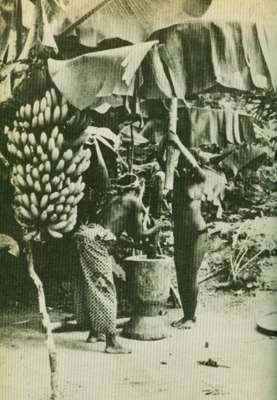
The author explained that the first Turnbull was a borderland Scot who turned the head of a charging bull and saved the King, so the pygmies named him Eba-mu-nyama - literally, "His father killed an animal". A well-meaning European's attempts to convince some pygmy clans to settle and farm cleared land on the edge of the forest - where they died at a high rate from exposure to the sun. The tears of a mother when Turnbull showed her daughter, crippled by hip dysplasia, how to walk using crutches. All in all a fascinating account of a world that was then, and still is under threat. I've written this in the present tense - hopefully that's not entirely in vain.
This was a fantastic book. I had to read it for my Ethnology class and fell in love with the MaButi Pygmies. Turnbull does a great job of explaining the lives of the "forest people." His few years with the Pygmies are portrayed in this book. It is enchanting and amusing. I would recommend it to anyone.
This ethnography of the Mbuti Pygmy of Africa's Ituri forest is a fabulously romantic piece, and a refreshing look at a people that have suffered from exploitation and the image of being hopelessly primitive. The late Dr. Turnbull uses reflexivity and a particularly observant eye to capture his subjects in time and offer up this portrait to his readers. As such, the book's appeal is undeniable.
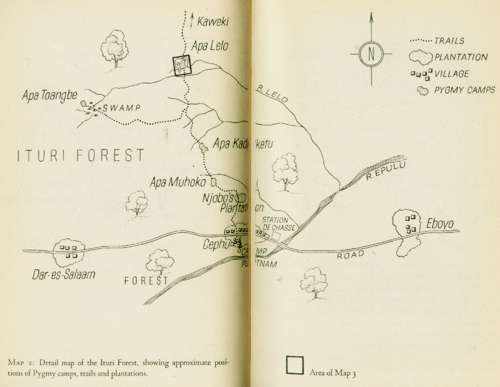
I always ship books Media Mail in a padded mailer. This book is shipped FOR FREE via USPS INSURED media mail (“book rate”). All domestic shipments and most international shipments will include free USPS Delivery Confirmation (you might be able to update the status of your shipment on-line at the USPS Web Site and free insurance coverage). A small percentage of international shipments may require an additional fee for tracking and/or delivery confirmation. If you are concerned about a little wear and tear to the book in transit, I would suggest a boxed shipment - it is an extra $1.00. Whether via padded mailer or box, we will give discounts for multiple purchases. International orders are welcome, but shipping costs are substantially higher.
Most international orders cost an additional $12.99 to $33.99 for an insuredshipment in a heavily padded mailer, and typically includes some form of rudimentary tracking and/or delivery confirmation (though for some countries, this is only available at additional cost). There is also a discount program which can cut postage costs by 50% to 75% if you’re buying about half-a-dozen books or more (5 kilos+). Rates and available services vary a bit from country to country. You can email or message me for a shipping cost quote, but I assure you they are as reasonable as USPS rates allow, and if it turns out the rate is too high for your pocketbook, we will cancel the sale at your request. ADDITIONAL PURCHASES do receive a VERY LARGE discount, typically about $5 per book (for each additional book after the first) so as to reward you for the economies of combined shipping/insurance costs. Your purchase will ordinarily be shipped within 48 hours of payment. We package as well as anyone in the business, with lots of protective padding and containers.
All of our shipments are sent via insured mail so as to comply with PayPal requirements. We do NOT recommend uninsured shipments, and expressly disclaim any responsibility for the loss of an uninsured shipment. Unfortunately the contents of parcels are easily “lost” or misdelivered by postal employees – even in the USA. That’s why all of our domestic shipments (and most international) shipments include a USPS delivery confirmation tag; or are trackable or traceable, and all shipments (international and domestic) are insured. We do offer U.S. Postal Service Priority Mail, Registered Mail, and Express Mail for both international and domestic shipments, as well United Parcel Service (UPS) and Federal Express (Fed-Ex). Please ask for a rate quotation. We will accept whatever payment method you are most comfortable with. If upon receipt of the item you are disappointed for any reason whatever, I offer a no questions asked return policy. Send it back, I will give you a complete refund of the purchase price (less our original shipping costs).
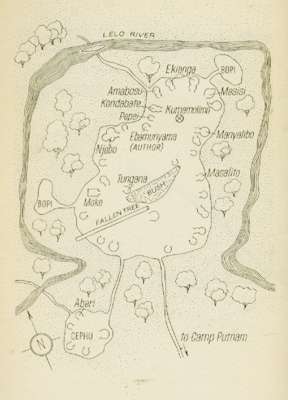
Most of the items I offer come from the collection of a family friend who was active in the field of Archaeology for over forty years. However many of the items also come from purchases I make in Eastern Europe, India, and from the Levant (Eastern Mediterranean/Near East) from various institutions and dealers. Though I have always had an interest in archaeology, my own academic background was in sociology and cultural anthropology. After my retirement however, I found myself drawn to archaeology as well. Aside from my own personal collection, I have made extensive and frequent additions of my own via purchases on Ebay (of course), as well as many purchases from both dealers and institutions throughout the world - but especially in the Near East and in Eastern Europe. I spend over half of my year out of the United States, and have spent much of my life either in India or Eastern Europe. In fact much of what we generate on Yahoo, Amazon and Ebay goes to support The Hermitage Museum in St. Petersburg, as well as some other worthy institutions in Europe connected with Anthropology and Archaeology.
I acquire some small but interesting collections overseas from time-to-time, and have as well some duplicate items within my own collection which I occasionally decide to part with. Though I have a collection of ancient coins numbering in the tens of thousands, my primary interest is in ancient jewelry. My wife also is an active participant in the "business" of antique and ancient jewelry, and is from Russia. I would be happy to provide you with a certificate/guarantee of authenticity for any item you purchase from me. There is a $2 fee for mailing under separate cover. Whenever I am overseas I have made arrangements for purchases to be shipped out via domestic mail. If I am in the field, you may have to wait for a week or two for a COA to arrive via international air mail. But you can be sure your purchase will arrive properly packaged and promptly - even if I am absent. And when I am in a remote field location with merely a notebook computer, at times I am not able to access my email for a day or two, so be patient, I will always respond to every email. Please see our "ADDITIONAL TERMS OF SALE."


| |||||||||||||||||||||













